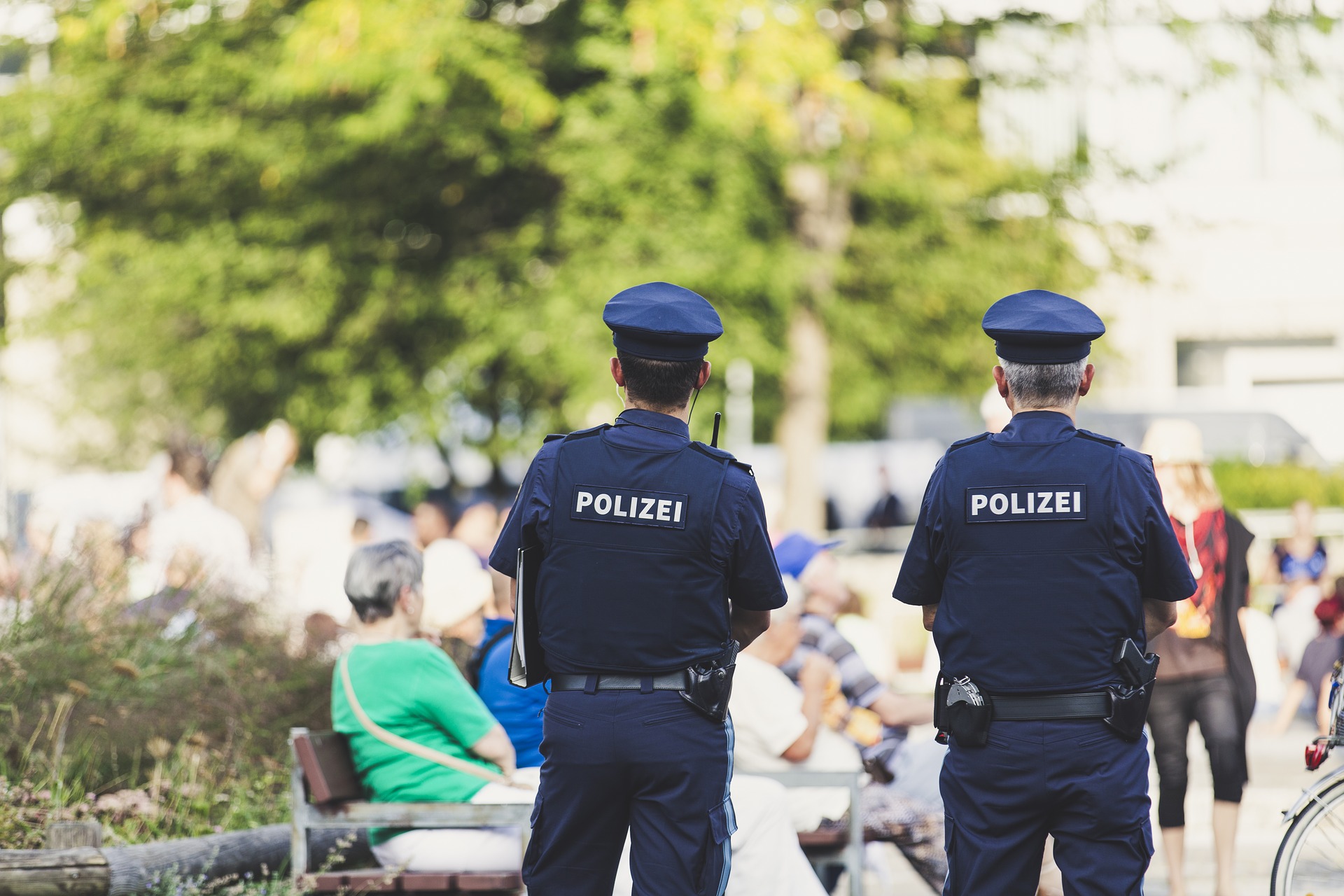Text by Ida Flik
Regulations to slow the spreading of Covid-19 are not only having an impact on all of our private lives and the economy. Social movement organizers and activists are facing a situation that makes many traditional forms of political protest – mass gatherings in the form of marches and rallies – impossible due to social distancing.
In Germany, lawyers, human rights monitoring NGOs, campaigners and journalists have criticized police and authorities for clamping down on protest actions regardless of their adhering to virus-spreading precautions.
On April 5th, organizers of the #LeaveNoOneBehind campaign invited people to drop off shoes in front of Berlin’s landmark Brandenburger Tor. A “double-digit” number of participants who did so were stopped by police, their personal data recorded and are now facing criminal charges. The campaign, which calls for the evacuation of refugees stuck in Greek camps, had designed the action with the intention to protest without gathering many people in the same place at the same time.
“I am shocked”, one interviewee on-site comments. “The fact that this kind of protest is prevented by the Berlin police […] leaves me speechless.” There are about a dozen people spread across the large square, plus police officers.
“This became a struggle for freedom of political expression. That is not the struggle we intended to fight – we intended to fight for the people in Moria and on the Greek borders”, Ronja Weil, one of the organizers, comments.
When searching for the keywords “Germany” and “Corona” online, one finds headlines from international media mainly writing about Germany’s success in keeping Covid-19 death rates comparatively low. One of the main rules in effect since March 22nd is the so-called “contact ban”, banning gatherings of more than two people and requiring a 1,5 m distance between any two persons (these do not apply to people living in the same household). Federal states have slightly differing regulations, but the penalty for breaching the two-person-rule starts at €200.
However, from the very beginning, there has also been criticism of the rules being enforced with varying strictness. On March 30th, refugees living in a mass accommodation in Bremen protested against the confined living conditions that made adhering to virus-spreading precautions impossible. While multiple protestors were charged for violating the 1,5m-distance rule and are now facing fines and even imprisonment, locals reported that a popular spot on the nearby lake was packed with people during the same weekend – without any police presence or interference.
In addition to the distance-keeping rules, two federal states completely prohibited any gatherings. This was ruled unconstitutional by Germany’s highest court on April 16th – however, in most other states, gatherings are still prohibited by default, with the possibility to request exceptions. Lawyer Pauline Weller called this change “constitutionally problematic”. In her opinion, “the democratic constitution must generally allow assemblies. In individual cases, they can still be banned”.
Fionnuala Ni Aolain, UN Special Rapporteur on the Protection and Promotion of Human Rights while Countering Terrorism, has been monitoring the use of so-called emergency powers by states across the globe for decades. “When we talk about [emergency] powers, what we mean, in fact, is the power of the state to limit rights”, which she emphasizes are “not a blank check to the state”. She explains that under international law, only measures that are necessary and proportionate are allowed: “meaning that a wishlist of powers that a state might like to have for other reasons, but are not in any way related to the protection of health, would be inconsistent with the lawful exercise of emergency powers.”
Valentin Hacken is one of the organizers of a demonstration that called for decentralized accommodation of refugees currently in mass housing. He decided to legally challenge the local authorities after receiving a “no” for the planned protest – despite having filed a concept for preventing infections. “The administrative court [of Saxony-Anhalt] found that the authority’s discretionary powers are reduced to zero. If all safety precautions are taken at the assembly, it must be allowed to take place. It is not for the state to decide what is and what is not a reasonable assembly”, he told the public-service broadcaster MDR in an interview.
Even political protests of one or two-people groups – which are still allowed without restrictions, generally – have been considered illegal assemblies by police. On April 11th, police officers forcibly took off the t-shirt of an older woman who was protesting against the current migration policies in Lüchow in North-Rhine Westphalia. Even though she was by herself, the print on her t-shirt could animate passers-by to stop and read resulting in the spontaneous forming of a group, according to the reasoning of officials.
A video taped in Berlin from May 1st shows police asking a young person to put away a copy of the German constitution she is holding in front of herself like a sign – repeatedly telling her “she is not allowed to show a political statement”.
Maria S. recalls similar experiences. In a protocol circulated on May 2nd, she writes: “Yesterday I was walking through [Berlin-]Wedding with a friend and her baby in a pram in the early evening, with cardboard signs on my backpack, criticising the current blatant restriction of our freedom of assembly and calling for refugees at the external borders to be given the same protection against infection as the people here. We wrote this with chalk on the pavement, too. Within 3-4 hours, we were surrounded twice by about 6-8 police officers, sometimes more. They accused us of holding an assembly, on the grounds that an assembly starts with 2 or more people and because we expressed a political opinion on cardboard signs.” S. says that their personal details were recorded and the chalk, as well as signs, confiscated, while they were explicitly told that “the problem was the political content”.
Other socially-distanced formats like car and bike rallies have also ended in police stopping them, recording personal details and issuing charges. For example, multiple small-group bike demonstrations in Berlin on April 26th, again organized by the alliance behind the #LeaveNoOneBehind campaign, resulted in 170 people being investigated for criminal offences. If convicted, the penalty code for attending an illegal assembly includes a prison sentence of up to 5 years.
In Leipzig, authorities asked the organizers of a “demonstration for the preservation of the freedom of assembly especially in times of Corona” to record all attendees’ personal details. The network called “Leipzig Nimmt Platz” called this additional requirement “untenable” and in turn called off their protest, while emphasizing that they “would have supported all other requirements to prevent infection, such as masking, limitation of participants, disinfection and distance regulation”. From organizer Irena Rudolph-Kokot’s point of view “this contradicts the meaning of freedom of assembly – because when I go to the hardware store, I don’t have to give any data, either”. Jürgen Kasek, a lawyer, “questions the legality of the ordinance”. The network has decided to appeal the decision.
Rudolph-Kokot explains why political activism is important, even in the midst of a pandemic: “For example Greece – the refugees – […] there is a need for further action there. We have a need for action on the subject of climate. There is a need for action in many social areas at the moment. […] There is a great need to express opinions, to point out remedies.” She adds: “It is important for political decision-making processes that this democratic discourse takes place in civil society, and it often takes place at gatherings. If this discourse does not take place, that is a problem for a democracy.”
In Germany, COVID-19-related rules are to be the officially relaxed beginning of May. In Saxony the new regulations will allow for assemblies of up to 50 people without any registration of personal data, Berlin has announced similar rules from May 4th on, along with the state-wide re-opening of churches, mosques, synagogues and other places of worship, playgrounds, museums and exhibitions as well as zoos.
Meanwhile, some groups have been more successful with safety-precaution-compatible protest actions. In Potsdam, people brought banners for standing in line at a local bakery – an idea that was later replicated by activists in Leipzig. An annual anti-speculation protest was turned into a car rally this year and was able to go ahead, even though spokesperson Erika Schickhäuser-Gosse mentioned many challenges along the way. The “MyGruni“ protest organized and held in Berlin every year was also limited to 20 persons despite their total lack of physical contact or chance of getting close. Fridays for Future had previously replaced their planned marches for the global climate strike on April 24 by collecting signs from all over town and laying them out on a large green area in front of the parliament.
UN Special Rapporteur Fionnuala Ni Aolain put the need for critical monitoring of authoritative measures in times of crisis in a larger context: “We know that there are a couple of things that are really problematic about emergency powers: First of all, even temporary powers have the persistent tendency to stick. […] States use emergency powers, resort to emergency powers, but rarely give them back at the point where the emergency is over. There is a really high correlation between states of emergency and the abuse of human rights – that correlation has been tracked for many years by scholars, by activists, by NGOs, by UN entities. […] Generally, emergency powers leave states a great deal of latitude to do what they want. They take out many of the oversight mechanisms.”





